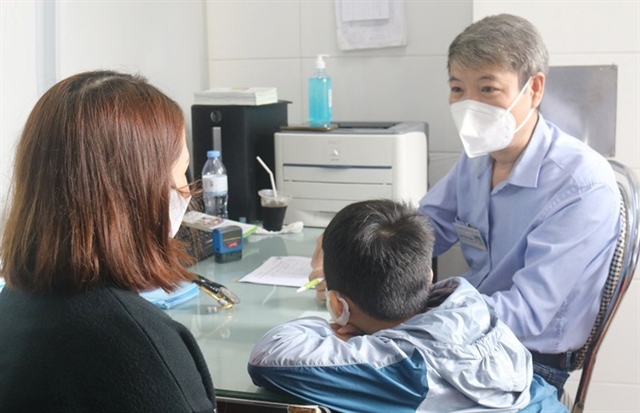 Society
Society

Experts believe that Việt Nam has enough policies around supporting the mental health of students but in implementation, there are still many obstacles.

|
| A doctor from the National Paediatrics Hospital gives consultancy to a mother with son suffering from depression. — Photo hanoimoi.com.vn |
HÀ NỘI — Experts believe that Việt Nam has enough policies around supporting the mental health of students but in implementation, there are still many obstacles.
At a seminar on students’ mental health held by the National Assembly's Committee on Culture and Education last Friday, Professor Nguyễn Quý Thanh, principal of the Hà Nội University of Education, said that it was necessary to have teachers specialised in mental health.
He said that if teachers were not trained in skills related to psychology and education, but consult students on these matters, it could do more harm than good.
Nguyễn Tùng Lâm, principal of the Đinh Tiên Hoàng High School, said that the more developed the society, the more contradictions and conflicts it created. From childhood, it is necessary to create antibodies, to promote the latent capacity in each person to help students adapt and overcome.
He said the education programme 2018 changed a lot, developing quality and competence, reducing theory and enhancing practice.
“But is it respecting children's development at different ages? In many stages, we focus on the high school and university period only. This is an essential period for people’s development, but the earlier stage can be considered the foundation and also need to be addressed,” said Lâm.
He added that nowadays, when mentioning education, people often think of school education without paying attention to family education.
“Family education is an issue to focus on, considering it as a measure of social development to solve domestic violence,” said Lâm.
He suggested that the Ministry of Education and Training and other departments have a programme to train students’ parents for their different development stages.
Agreeing with Lâm, Nguyễn Thu Anh, principal of the Nguyễn Tất Thành Junior Secondary and High School, believes that education to help teachers and parents understand more about mental health should receive more attention.
More and more Vietnamese people care about their physical health, but their understanding and concerns are still limited.
Thu Anh took an example that happened at her school.
“When I worked with a parent, his child suffered from depression. A doctor suggested that he should be absent from school for ten days and hospitalised, but his father said he was pretending, he still has enough meals, watches movies all day but keeps feeling tired when studying," she said.
The school quickly had a meeting to discuss ways to support the student.
Early discovery
Nguyễn Thị Thanh An, an expert from the United Nations Children’s Fund (UNICEF), said that there were many kinds of research about children’s mental health, but she quested quality of services related to mental health support for children, data for mental health and connection between education, health and labour, invalids and social affairs sectors.
She also asked, while people mention additional skills for parents, who will supply such skills, and who will coordinate in the community.
Each sector has different policies related to mental health, but there needs to be interdisciplinary coordination and a governing body, she said.
Nguyễn Trọng Khoa, deputy director of the Medical Services Administration under the Ministry of Health, said that children's mental health must be addressed in three directions.
Of these, prevention is the priority, then detection, and lastly early treatment. Those who detect early, and treat early are none other than teachers and parents.
Khoa suggested a master plan, assigning tasks to state management units, and coordinating with many different agencies, with the support of international organisations and non-governmental organisations.
With cooperation, prevention, early detection, and early treatment, it will be highly effective and sustainable.
Nguyễn Thị Mai Hoa, deputy chairwoman of the National Assembly's Committee on Culture and Education, said that immediately after the seminar, the committee would analyse experts’ opinions, and transfer proposals to the authorities.
Issues that need to be further researched would continue to be raised in expert consultation forums in the near future, she said. — VNS




